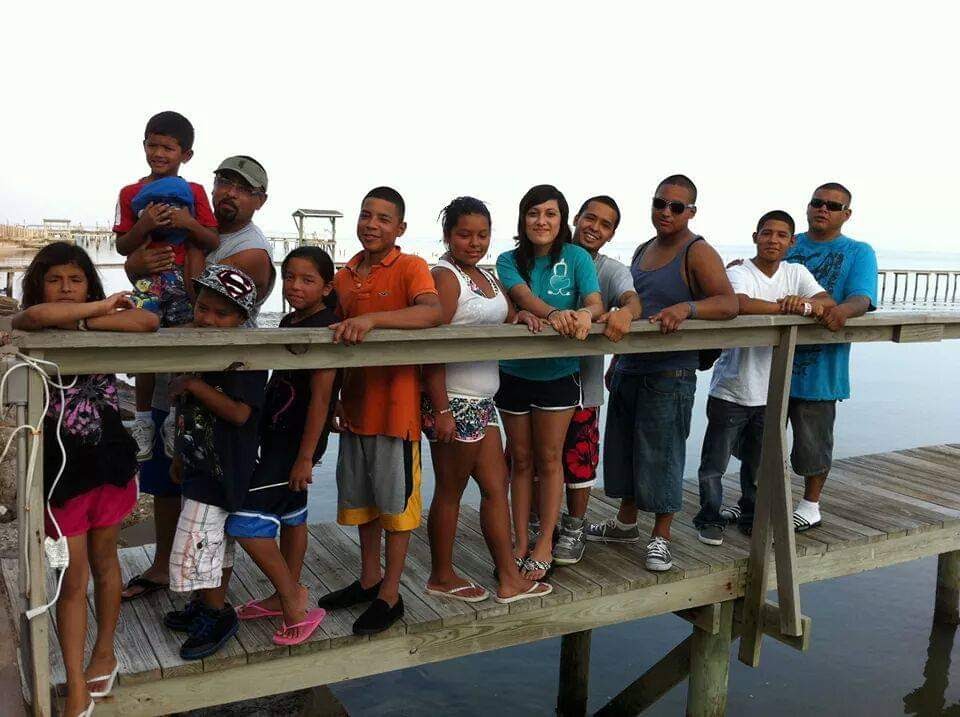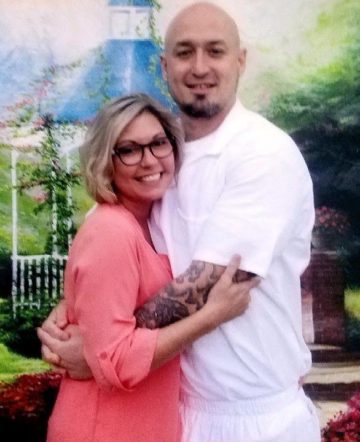Justin Phillips didn’t have much of a relationship left with his 5-year-old son by the time he was sentenced to 10 years in prison on drug charges in 2016. “I hadn’t seen him in a long time; I’d been out there selling drugs, so it’s not surprising his mom didn’t want me around,” he says. In prison, Justin became determined to turn his life around and re-establish a connection with his son. He obtained a GED and completed substance abuse, anger management, and gang-disassociation programs. A couple years into his sentence, Justin’s son began regularly visiting him at the Estelle Unit, the East Texas prison where he’s currently incarcerated.
Justin says that relationship started fraying again in March as COVID-19 spread across the state, shuttering visitation in lockups across Texas and the rest of the country. Unlike many states and the federal prison system, the Texas Department of Criminal Justice (TDCJ) didn’t offer video visits via computers or tablets when the pandemic hit, which would have provided a lifeline for people abruptly cut off from their support networks.
Since the beginning of the pandemic, little has changed for most families when it comes to seeing and communicating with a loved one inside Texas prisons. In August, Securus Technologies, the private company that contracts with the agency for prison phone services, started offering video visits for families in 12 of the more than 100 state prisons, once a month and, at least temporarily, for free. TDCJ spokesman Jeremy Desel says the agency has a separate “pilot” program for video visits through tablets that now covers somewhere between 20 and 30 other prisons, although he didn’t provide a list of which ones.

That means that the majority of state lockups still don’t have video visitation. Thousands of people like Justin have spent nine months in near-total isolation from their families. Desel says that TDCJ is continuing to expand access to video visits, but that old prisons in rural, far-flung parts of the state make that a technically challenging and slow-going process. As the virus continues to spread across the state, there are no plans to re-open visitation. It could still be months before Justin and others get to see their families in person.
Family members on the outside say the pandemic has made the increased separation from loved ones particularly difficult and frightening. Many have contracted COVID-19, which has spread through Texas prisons at an alarming rate. In letters and phone calls home, they complain about inedible or insufficient meals. Some are struggling with mental health issues exacerbated by the increased isolation. Many claim that prison staff have delayed treatment for other urgent health problems because of the virus.
Justin still tries to communicate by phone with his son but months without seeing each other has made him painfully distant. “He’ll barely even talk to me anymore,” Justin says. “He can’t see me anymore and he hasn’t for such a long time. It feels like I’m just out of sight, out of mind.”
*
COVID-19 didn’t create problems inside the Texas prison system, so much as it magnified them. A November report from the University of Texas at Austin points to the devastating impact of the coronavirus behind bars. People incarcerated in Texas prisons have been infected at a 40 percent higher rate and died at a 35 percent higher rate than the national prison population average, according to the report. More people incarcerated here have died from COVID-19 than in any other prison system; more than half of them were eligible for parole, and at least nine had already been approved for release. The report also shows how Texas prisons have struggled to reduce coronavirus-related deaths compared to other state prison systems that also had high death counts early in the pandemic.
Governor Greg Abbott, whose office didn’t respond to a request for comment on the issues raised by families in this story, has largely ignored this crisis. Advocates for incarcerated people and their families have long pointed to mental illness and suicide behind bars as reasons for state lawmakers to create an independent body to monitor conditions inside Texas prisons and fix problems before they mushroom into tragedies. They say COVID-19 underscores the need for independent oversight.
Michele Deitch, an expert on prison oversight who co-authored the UT report, fears that the conditions people in lockup have been forced to endure during the pandemic, combined with the increased separation from people on the outside, has created a mental health crisis inside Texas prisons. “This has been such a traumatizing experience for so many people,” she says. “The fear, the anxiety, the fact that people are seeing more of their cellmates die.”
Even before the pandemic hit, suicides and suicide attempts inside the Texas prison system were already the highest they’d been since the 1990s. By September of this year, more people incarcerated by TDCJ had taken their own lives than in all of 2019. One of them was Ricky Hernandez, 26, who struggled with mental illness throughout his life, according to his family. Treatment records show Ricky was hospitalized for a major depressive disorder and put on multiple psychiatric medications before he entered prison in 2017 on charges of harassment and violating a protective order. Henry, his older brother, says that Ricky struggled in prison because of his illness. To try and cheer him up, a big group of family members used to visit him every other week at the Coffield Unit, the East Texas prison where he lived in solitary confinement.

“It was always me, my mom, some aunts, our brother and sisters, just as many as could make it because we knew he liked seeing us,” Henry says. At the start of most visits, his brother seemed on edge, eyes darting around the room, but usually seemed to relax somewhere in the middle, he says. “I think we helped settle him down.”
Henry says his brother stopped writing as frequently after visitation stopped in March. Prison officials called the family in early May to say Ricky had tried to take his own life. Then, on May 22, Ricky was “discovered unresponsive and hanging in his cell,” according to a report the prison filed with the Texas Attorney General’s Office. After his death, someone housed near Ricky wrote to the family claiming that officers hadn’t checked on him for hours before his death. For months, Henry has called the prison system’s Office of the Inspector General (OIG), which investigates deaths in custody, asking whether his brother was treated for mental illness or checked on by guards the day he died. They have yet to give him any answers. OIG did not respond to the Observer’s questions about Ricky’s death.
“I want to know whether they checked on him, I want to know if an officer failed to do their job,” Henry says. “Whether they were too lazy or too busy or just being stretched too thin, I just want to know what happened to my brother.”
*
Prison families, researchers, and even TDCJ officials agree that visitation is a critical lifeline for incarcerated people, and integral to their rehabilitation. Research has shown that visits with loved ones can maintain and strengthen social ties that can help prevent criminal behavior during and after incarceration.
Despite the well-documented benefits, many families have been blocked from seeing loved ones since long before COVID-19 shuttered visits for everyone. Some people accused of running afoul of prison rules have been banned from visitation for years, sometimes due to petty or unproven claims of wrongdoing.
Before the pandemic, advocates for incarcerated people had called on TDCJ to keep prisoners and loved ones accused of misconduct connected—including through video visits. TDCJ hasn’t done that. Agency spokesperson Desel says there are currently no plans to extend video visits to people like Sandra and Jessie Gonzales, who were kicked off their son Andrew’s visitation list in September 2019 after officers caught him with pills he’d snuck back into prison after a stint in the hospital.

Andrew insists his parents had nothing to do with the pills, yet they are nonetheless blocked from seeing him at the Jester III Unit, where he’s incarcerated. Sandra, 69, says she tried signing up for video visits that officials started offering at the prison this summer but was rejected. “It’s been more than a year that we haven’t been able to see him and all because of something we had nothing to do with,” she says. “We’re getting old. We don’t know how much time we have left to even see him.”
It’s also been more than a year since Kasie Cantu has seen her husband, Juan, who’s incarcerated at the Darrington Unit outside of Houston. Last summer, officials at the prison kicked her off the prison’s visitation list for what was effectively a misunderstanding. After more than a year of appeals to prison officials, she was put back on Juan’s visitation list last month—a bittersweet victory, since visitation remains closed for the foreseeable future due to the pandemic. The prison isn’t offering video visits.
“We’d already gone so long without seeing each other that in some ways it wasn’t so bad for us when COVID first started,” she says. “But it gets harder the longer this goes on. Morale is already so low in there, and this has made it so much worse with everyone being so isolated and so scared.”
*
Even before COVID-19 upended the Texas prison system, trying to care for a loved one who’s sick and suffering behind bars was frustrating and scary. The increased isolation during the pandemic has compounded that anxiety. And while complaints of shoddy treatment inside TDCJ predate the pandemic, some families claim prison staff have used COVID-19 as an excuse to delay medical care for other urgent problems.
Dana Blackmon says her husband, Jacob, began experiencing severe stomach pains right around the time that the threat of the novel coronavirus stopped her from visiting him at the Polunsky Unit. Numerous grievances, requests for treatment, and letters to prison officials that Dana shared with the Observer show that she struggled for months to get Jacob seen by a specialist as his condition worsened. One request for treatment in June was stamped with a message stating it had been screened by medical staff, wasn’t deemed urgent, and was deferred “due to pandemic COVID-19.” In one July email to prison officials, Dana wrote, “My husband is going to die in there if he does not receive the medical care that he needs right away!” Neither TDCJ nor the University of Texas Medical Branch, the medical provider for the state prison system, responded to the Observer’s questions about Jacob’s treatment.

On October 9, Jacob, 42, was taken to the prison hospital in Galveston for pain and severe bleeding. Doctors diagnosed him with colorectal cancer on October 13. Dana says he had limited phone access and that they had to “communicate mostly through letters those final months.” She’d begged officials to let her visit him in the hospital because she lived just a short drive away. Instead, she says, staff gave them three five-minute video calls.
“Those five minutes went by so fast,” she says. “We tried to smile and stay positive, but when we looked into each other’s eyes, I could tell that he was terrified and he could tell that I was terrified.”
He died on November 3. She never got a chance to see him in person again.







